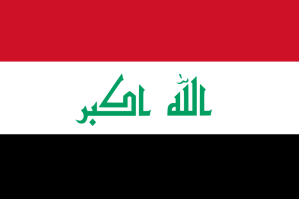Iraq
 Formerly known as Mesopotamia (Greek for “the land between the 2 rivers”, Iraq has been home to civilizations since the 6th millenium BC. The region is often referred to as the “cradle of civilization”, having given rise to such modern innovations as writing and the wheel. As with Palestine, the League of Nations granted the United Kingdom a mandate over Iraq after British armies drove the Ottomans out during World War I. The British combined what had previously been 3 separate territories, Baghdad, Basra, and Mosul, and suppressed Arab and Kurdish rebellions, installing a displaced Syrian king and Sunni elites as governors.
Formerly known as Mesopotamia (Greek for “the land between the 2 rivers”, Iraq has been home to civilizations since the 6th millenium BC. The region is often referred to as the “cradle of civilization”, having given rise to such modern innovations as writing and the wheel. As with Palestine, the League of Nations granted the United Kingdom a mandate over Iraq after British armies drove the Ottomans out during World War I. The British combined what had previously been 3 separate territories, Baghdad, Basra, and Mosul, and suppressed Arab and Kurdish rebellions, installing a displaced Syrian king and Sunni elites as governors.
Britain granted independence to Iraq in 1932 but maintained a military presence there to protect the supply of oil to western countries through World War II. In 1958, the Iraqi army overthrew the British-backed monarchy and a Soviet-friendly military regime took power, only to be overthrown by another regime 5 years later, and then another 5 years after that by the socialist Baath party. In 1979, Saddam Hussein took power as President of Iraq after pushing out the aging leader of the Baath party and killing or arresting his other rivals.
In 1980, Hussein declared war on the newly-theocratized state of Iran, whose recent Islamic revolution divided Iraq’s Shiite majority between supporters of the Baath party and supporters of Iran. The United States supported Iraq in this war but later led a UN coalition against Iraq’s 1990 invasion of Kuwait, which led to an eventual withdrawal of Iraqi troops from its oil-rich neighbor.
In 2003, the US led another international coalition into Iraq, this time to force Iraq to abandon its chemical and nuclear weapons program and to remove an “oppressive dictator” from power and install democracy. Following the invasion, the US installed an interim government and then elections for a permanent government were held in 2005. In 2009, the withdrawal of US troops from Iraqi cities was met with celebration, followed by a dramatic spike in crime and violence, including attacks on Iraqi security forces. Nevertheless, the Iraqi interior ministry recently reported death tolls at their lowest level since the 2003 invasion.
Iraqi Hip Hop has only emerged in the past few years, with the first known Hip Hop concert taking place in the summer of 2009 at the National Theater in Baghdad. As satellite dishes began popping up in the post-Saddam era (they were banned during the Hussein regime), Hip Hop music and videos have been streaming in through the TV and a number of young Iraqis have begun developing an Iraqi rap style. The 3 rappers who performed at the concert in Baghdad, Mr. Passion, J-Fire, and Nine Z, have formed a group they call Danger Zone Killer, or DZK. They each began rapping in 2004, shortly after the American-led invasion, and draw on themes of violence and war in their lyrics to relate the experience of young people growing up in Iraq in this era. These artists, and others like them, have expressed a fear of being targeted by Islamic extremists for producing music, which is banned by fundamentalist Islam, though they continue to develop their movement underground. At the same time, 2 popular rappers of Iraqi-origin have emerged in North America: the San Diego-born rapper Timz, who gained international attention with his politically-charged 2007 song “Iraq”; and The Narcycist, who was born in Basra, raised in Dubai, and now lives in Montreal, where he is highly active as a political artist, journalist, and activist.